| Construction Rating: | starstarstarstarstar_border |
| Flight Rating: | starstarstarstarstar_border |
| Overall Rating: | starstarstarstarstar_border |
| Diameter: | 1.34 inches |
| Length: | 20.00 inches |
| Manufacturer: | Semroc  |
| Skill Level: | 3 |
| Style: | Sport, Upscale |
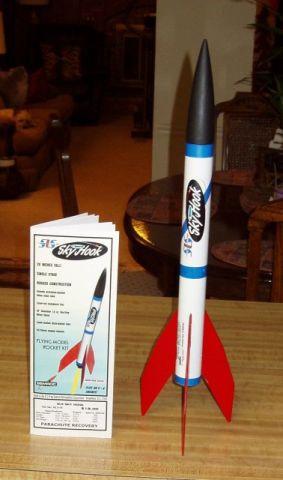
Brief:
This upscale of an old Estes kit is one of Semroc's new Semroc Large-Scale
(SLS) line. It flies on 24mm and 29mm motors in the C to F range. The kit
features thick walled body tubes, laser cut basswood fins, nylon chutes, a
laser slotted tube, and a Kevlar recovery leader.
Construction:
The kit from
BRS
Hobbies came nicely packed with a colorful insert, which also holds the
instructions. As you can see in the photos, individual parts such as the motor
mount, chute, fins, and miscellaneous small parts are all individually
packaged. No more dropping some small item followed by the associated
searching. The parts themselves are of outstanding quality. The fins are flat
and identical, the body tubes are very thick, the balsa nose cone is smooth and
hard. The instructions are short but clear and include plenty of diagrams.
There is even a brief history of Estes and of the kit itself. If you should be
unhappy with the kit, no problemo as Semroc has a 100% satisfaction guarantee!
So the parts include:
- one 1.34" diameter body tube, 12.25" long
- one 29mm motor tube
- one balsa nose cone, 4.75" long (exposed)
- three laser cut, basswood, through the wall fins
- one 3/16" lug
- one thrust ring
- one screw eye
- one elastic cord
- one Kevlar® thread
- one 18" nylon chute
- one 24mm engine mount adapter kit, consisting of
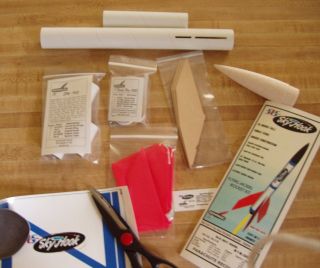
- one motor tube
- two centering rings
- one engine block
- one engine hook (for long 24mm motors)
- one spacer tube (to adapt short 24mm motors)
- one large waterslide decal
- one small specification decal, including the s/n (mine is #00040)
To build the kit, you require all the normal tools and supplies: white or wood glue, filler, paint, sandpaper, etc. I used wood glue throughout.
This was a simple kit to build and I followed the order of the instructions. I started with the 24mm motor mount, which had its own instructions. The slot for the motor clip was pre-cut and from there you glue in the motor block and the two wide and thick centering rings. These were actually pieces of tube that telescoped over the 24mm tube.
From there I proceeded to glue the motor block in the 29mm tube. You first tie the Kevlar® twine around the block. My first impulse was to go for the epoxy, but I decided to keep with the recommended wood glue.
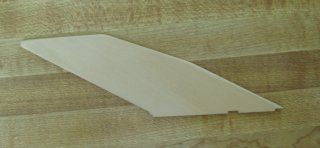 The next step
was to round the edges of the fins and test their fit. They required a few
swipes of sandpaper along their tabs. As you can see, since the motor tube fits
directly into the body tube, there isn't much of a tab. You weren't asked to
fill the grain at this point, so I didn't. On the EMRR review of another SLS
kit, I noticed a fin popped off. I decided to see how this kit fared. If I have
to make repairs, I'll try the epoxy.
The next step
was to round the edges of the fins and test their fit. They required a few
swipes of sandpaper along their tabs. As you can see, since the motor tube fits
directly into the body tube, there isn't much of a tab. You weren't asked to
fill the grain at this point, so I didn't. On the EMRR review of another SLS
kit, I noticed a fin popped off. I decided to see how this kit fared. If I have
to make repairs, I'll try the epoxy.
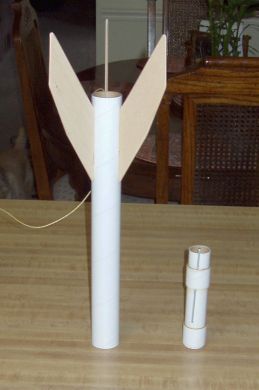 To install
the motor mount, you swab a liberal amount of glue just ahead of the fin tabs
and push in the mount. The fit of the tube is a little loose and you
immediately glue on the fins. I set the tube fins up to dry and noticed the
motor tube was sliding further into the body. Glad I caught that one! The TTW
fins, despite being shallow, should add a lot of strength and made fin
alignment trivial. Up to this point, everything was done in one sitting. I then
paused to let the motor mount and fins dry. I went back later and added an
internal fillet above the motor mount.
To install
the motor mount, you swab a liberal amount of glue just ahead of the fin tabs
and push in the mount. The fit of the tube is a little loose and you
immediately glue on the fins. I set the tube fins up to dry and noticed the
motor tube was sliding further into the body. Glad I caught that one! The TTW
fins, despite being shallow, should add a lot of strength and made fin
alignment trivial. Up to this point, everything was done in one sitting. I then
paused to let the motor mount and fins dry. I went back later and added an
internal fillet above the motor mount.
Next came fillets, adding the eye hook to the cone, and completing the recovery system. I didn't tie on the chute but instead added a snap swivel and added it to my stable of reusable chutes. After it was all together, I went to slide on the nose cone and found the shoulder was too large. Being balsa, sanding it down wasn't a problem and the result is a nice snug fit.
So far the PROs are: Great parts, clear instructions, straightforward build, very sturdy.
The one CON is that you have to make sure the motor tube doesn't slide out of place. This could be avoided if you let the glue set first, but the instructions say to proceed. Some sanding on the fins and cone was required, but this not a big deal and was discussed in the instructions. As a result, I don't really consider them CONs.
Finishing:
There are finishing instructions and they are typical. Minimal filling is
required due to the fine grain of the cone and basswood fins. I painted the
body white, nose black, and fins red, just like the cover drawing. The main
decal sheet includes one large wrap that covers the top half of the body tube
and a blue strip to go just below the fins. There is also a small specs decal.
On the plus side, the decals are thick and easy to work with. This is a very
good thing since it took me a month of Sundays to get the large decal
positioned. I also swabbed the bubbles forever, and there are still a few.
Anyway, I shot a clear coat to help the decals stay put. The decal color is
reasonably good, especially if the background is white.
Construction Rating: 4 out of 5
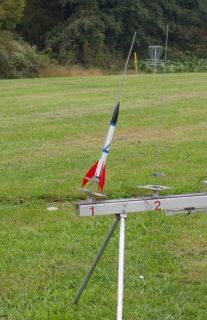
Flight:
The recommended motors include a C11-5, D12-7, E9-8, and F25-9. I suspect it
will fly well on any other motor in this range, such a 24mm F21 or a 29mm F20.
As built, mine weighs in at 3.46oz without the adapter and 4.12oz with. This is
heavier than the specified 3.0 oz.
For its maiden flight, I loaded it with the 24mm adapter and a C11-7. This is a longer delay than recommended but it's what I had. Plus I had added a strip of 'anti-zipper' cloth tape where the Kevlar® meets the top of the body tube, so I went for it. I held the adapter in with a lot of masking tape. The wadding was dog barf wrapped in Quest wadding. The flight was nice but ejection was late as predicted. Recovery was good on the largish chute. When I got to the rocket I found the eye-hook had pulled out of the cone, which was gone, and it also spat the adapter. I will split the blame on the cone since I used the wrong delay and the adapter was probably user error. All parts were recovered.
I CAed the eye hook back in, reseated the adapter, and swapped the chute for a 12 incher--there was a bit of wind early and I didn't want to feed the trees. The motor choice was a D12-5. This time the delay was shorter than recommended, but I angled the rod some to keep it from the tree line. It tore off like a bat and I didn't see where it ejected. However, recovery was 100% good this time. It was a grass landing and there were no cracked fillets even with the smaller chute.
I will try it on an E9-8 (this time a recommended motor) next weekend. I will have already submitted this review, so watch the logs below.
Flight Rating: 4 out of 5
Summary:
The materials in this kit were as good as I've ever seen and it was a pleasure
to build. The only build issue is to make sure the motor tube doesn't slip
while the fins dry. This could be fixed by a piece of tape or a watchful eye,
but it is a potential major "gotcha". I had to deduct a construction
point here.
This is a very sturdy kit and would be a great choice for someone who wants to move on from Estes kits to mid power. With the bigger motors, you better have a nice sized field!
My thanks to Brian at BRS Hobbies for sponsoring this review!
Overall Rating: 4 out of 5
Other Reviews
- Semroc SLS Sky Hook By Matt Gillard (September 5, 2007)
Brief: Semroc's SLS (Semroc large scale) range is one of the best ranges out in model rocketry. This rocket is an upscale of an old Estes rocket. The quality of everything is outstanding. Construction: The kit contains: a body tube, 12.25" long nose cone 3 laser cut basswood fins a 29mm motor tube 3/16" launch lug a thrust ring a screw ...
 |
 |
Flights
 |
 |
Sponsored Ads
 |
 |












D.M. (June 4, 2005)